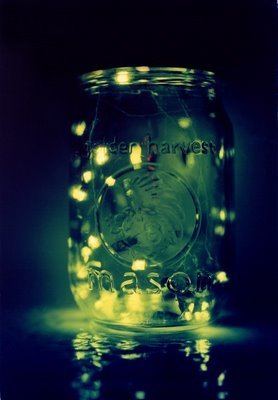Grace is often visited by her good friend Mary Whitney in a dreams.
Grace had dreamed about Mary in the past, often revisiting the happier
times the two shared together before Mary’s death. The dreams provided
her with a sense of comfort during the difficult time; dealing with
Nancy, the murders, her trial, and her time spent being shuffled between
the Asylum and prison.
However, one dream is not as pleasant. In this particular one, Mary
appears to Grace in Mr. Kinnear’s bedroom. Grace believes that she can
see Mary’s heart through her nightdress, but it is actually the
needle-case she made as a Christmas gift. Grace takes this as a sign
that Mary had not forgotten her kindness, since the needle-case was put
in the casket upon her burial.
Then, Grace notices that in Mary’s hand in a jar which holds a
firefly glowing in the dark. Grace retells how Mary, “took her hand from
the top of the glass, and the firefly came out and darted about the
room; and [Grace] knew that this was [Mary’s] soul, and it was trying to
find its way out, but the window was shut; and then [she] could not see
where it was gone.”
One of the themes that I have noticed throughout “Alias Grace” is
imprisonment. Most obviously, Grace is held accountable for the murders
by being sent to jail. Grace is also held prisoner by her own thoughts.
Since she cannot remember whether she committed the crimes or not, she
has no way to help prove her innocence since the memories do not exist.
Also, we see the theme of imprisonment with the different deaths
throughout the novel. Mrs. Marks died in the hull of the ship and the
according to the myth, her soul would be trapped below and left to
wander back and forth across the ocean unless it could escape through an
open window. Similarly, Nancy’s body is thrown into the basement after
the murder and presumably the same myth of the escaping soul exists. In
the quote from Grace’s dream, Mary’s soul experiences the similar
torment of looking for an escape. It is clear that all three of these
women struggled to live outside the oppression set forth onto them by
society. Mrs. Marks died trying to make a new life for herself and her
family in North America, but died to the poor conditions she was
subjected to as a second-class citizen. Nancy, who although seemed to
bring much of the trouble upon herself, tried to defy social ranks by
having an affair with her employer. She ran the household without being
recognized as the “woman of the house”. Lastly, Mary Whitney was a girl
who fell in love and was harshly betrayed due to her social standing.
All three women were trapped both in life and death.

No comments:
Post a Comment